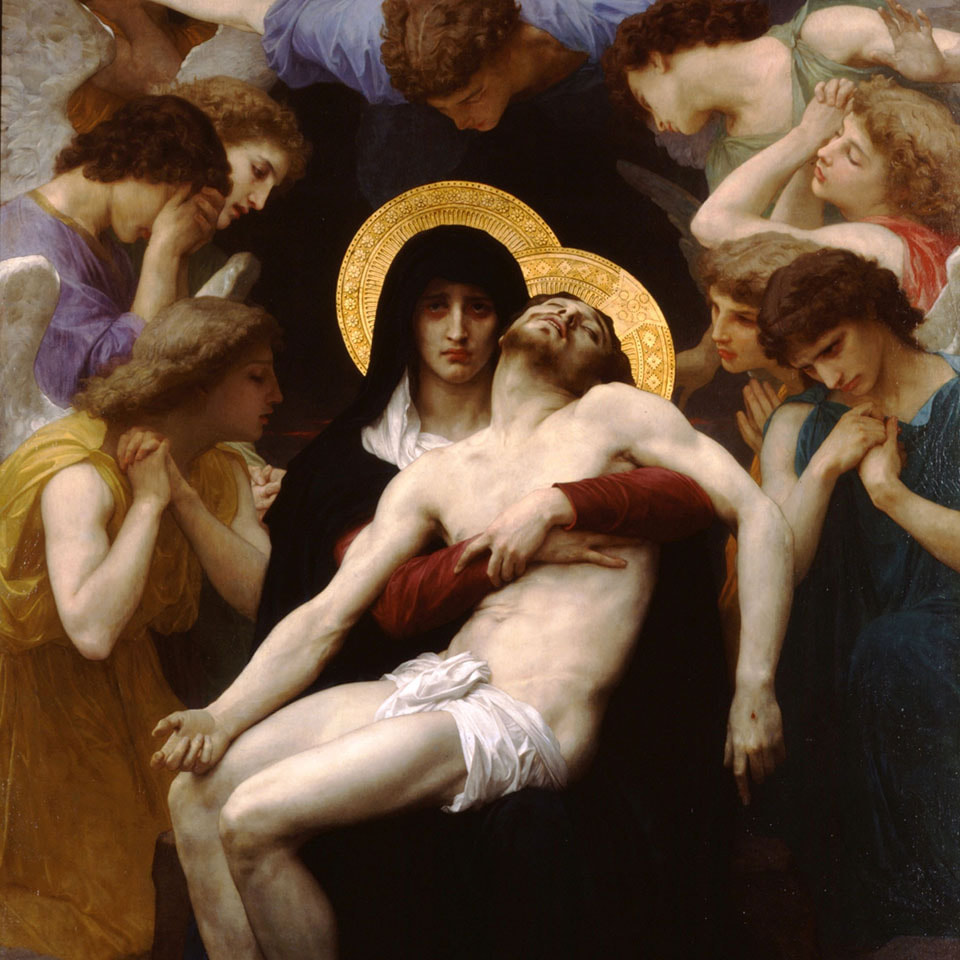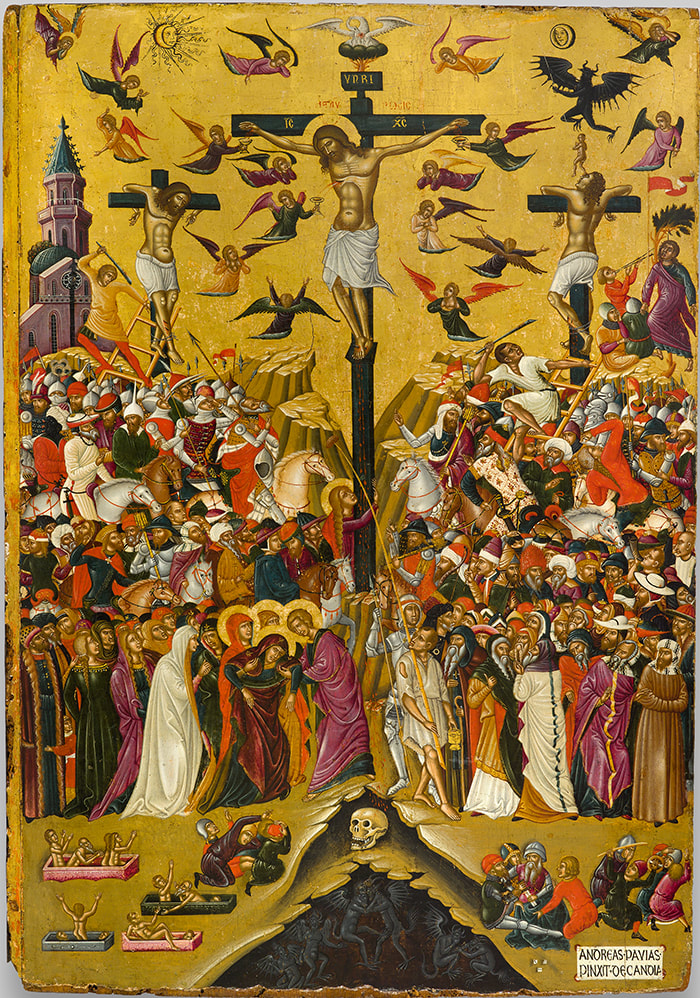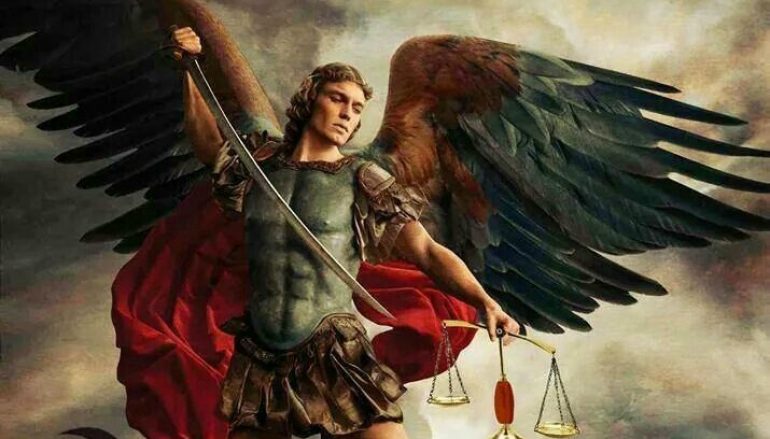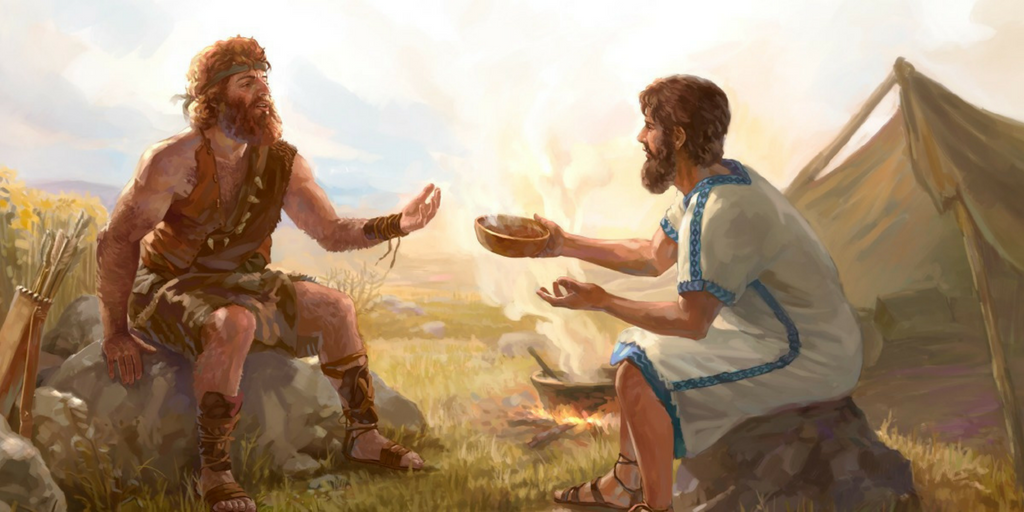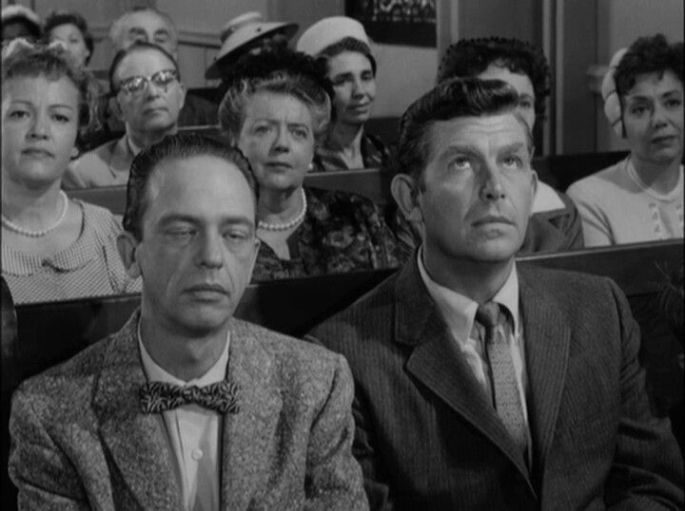|
11/14/2023 0 Comments Catfish and Cornhole!WE'RE CELEBRATING 100 YEARS OF WORSHIP AND SERVICE on the Feast of St. Andrew (transferred)! Saint Andrew was a fisherman, so his feast day is traditionally celebrated by eating fish and playing games and music common to seafaring people. We're doing it Texas style with catfish and cornhole. Bp. Reed will preach and celebrate. We hope you’ll join us and bring a friend or two!
0 Comments
8/15/2023 0 Comments The Wind and the WavesThe Hand of God, painted by Yongsung Kim A meditation on Matthew 14:22-33, Jesus Walks on Water The Gospel lesson of Jesus walking on the water teaches us several important lessons:
5/25/2023 0 Comments the power of pentacostWhen the Holy Spirit arrived, He took the form of a rushing wind that filled the whole house and landed upon the heads of each disciple within the upper room, and then appeared in the form of fire. It was the day of Pentecost, a Holy Day celebrated as the pouring out of God’s Holy Spirit upon the Church. So why did the Father and Son send forth the Holy Spirit to indwell the members of the Church, the body of Christ? Because it was customary that when a King ascended to His throne, He gives gifts. In this case, Jesus Christ sent the sevenfold Spirit of God to distribute to the members of His army spiritual gifts so that men might be empowered to persist in the great commission. He commanded, “Go into all the world and make disciples of men baptizing them in the Name of the Father, and the Son, and the Holy Spirit.” (See I Corinthians 12 and Ephesians 4.) How should we understand this great commission? It is the completion of the Holy War begun by Jesus Christ in His earthly ministry and culminated by His death and resurrection. When I say war, I am referring to the direct way that living and speaking the gospel of Jesus Christ confronts the ideas and knowledge of the world. It is a clash of ideas that has the power to change and transform men in their thinking and understanding, and thereby it is spiritual warfare. In meditating upon the verse, “How shall they believe in Him whom they have not heard” (Romans 10:14), Dallas Willard wrote the following in his book, Renovation of the Heart: “Without correct information, our ability to think has nothing to work on. Indeed, without the requisite information, we may be afraid of thinking at all, or simply incapable of thinking straight.” … “The Gospel of Jesus directly repudiates all false information about God and, therewith, about the meaning of human life; and it works to undermine the power of those ideas and images that structure life away from God. But for it to have this effect we must use our ability to think.” The Holy Spirit gives godly men and women the gifts of spiritual wisdom, knowledge, faith, healing ministry, miracles, prophecy, the power to discern spirits, the ability to speak in tongues and the ability to interpret them. These gifts operate first within the ordained offices of the Apostolic ministry as Christ gave some to be apostles, some prophets, some evangelists, some pastors, and some teachers for the equipping of the Saints for the work of ministry. But we are all called to work along side the Father as the body of Christ to transform men’s thinking to the knowledge of God the Father through Jesus Christ the Son. Our commission as sons and daughters of the King is to put to good use the gift of the Holy Spirit, to live out the high call of the Kingdom in our worship and in our daily lives. We hope you will celebrate this important holy feast with your church family this Sunday! 3/30/2023 0 Comments A Guide to Holy WeekAs we conclude Lent, it’s time to lift our eyes toward the cross and prepare for Holy Week. This guide is to help you prepare to walk with Jesus during the week of his crucifixion, and to participate with a deeper appreciation of these ancient traditions which the Church has practiced since the time of the Apostles. HOLY WEEK begins on Palm Sunday, which commemorates Jesus’ triumphal entry into Jerusalem. First, we hear the Gospel narrative of Jesus’ entry into Jerusalem. Then we use palm fronds and palm crosses to remind us of the palms that were waved and strewn in Jesus’ honor and of the Cross to which he was destined. Once the procession is over, the mood changes as we hear the Passion story (the story of Jesus’ arrest, trial, and crucifixion). The crowd that greets Jesus on Palm Sunday shouting “Hosanna” becomes the crowd shouting “Crucify him” by the end of Holy Week. Recognizing this shift leads us to ask whether our love for Jesus is just as fickle. Do we by turns applaud him and, by our behavior and thoughts, crucify him again and again? Spy Wednesday is traditionally remembered as the day that Judas betrayed the Christ to the Pharisees. Some churches offer a Tenebrae service on this day, which is a series of readings and dousing of candles and lights so that which each account of Christ's betrayal and suffering the darkness increases until there is no light. It's a powerful reminder of how our little betrayals darken the light within us. Maundy Thursday takes its name from an altered form of mandatum est, Latin for ‘he commanded’. John’s Gospel records that Jesus washed his disciples’ feet when he ate with them for the last time and commanded them to do the same. For this reason, we have a symbolic foot washing at the Eucharist on Maundy Thursday. We also give thanks for Jesus’ institution of the Eucharist at the Last Supper. When the Eucharist is over, two notable things happen. First, the sacrament is taken to the Chapel, which has been specially decorated to represent the Garden of Gethsemane. Second, the altar is stripped of its furnishings, which reminds us of the way in which Christ’s tormentors stripped him of his clothes before the Crucifixion. There will be a Vigil in the Chapel before the ‘Altar of Repose’ (so called because the sacrament reposes there). Doing this reminds us of Jesus’ agony in the Garden of Gethsemane, where he had to resolve his will to obey his father’s will and endure crucifixion and death. Believers are encouraged to spend an hour in prayer remembering Christ’s petition, “Can you not watch one hour?” Good Friday is the most somber day of the Church’s Year and, along with the Easter celebration of the Resurrection, the most important. The most ancient way of marking Good Friday is with a service (the Solemn Liturgy) in the middle of the day when the story of Jesus’ Crucifixion is read dramatically. The Solemn Liturgy at St. Andrew’s will begin at 5.30 p.m. After the reading of the Passion, there is the Veneration of the Cross in which participants are encouraged to come forward and kiss the feet of Christ on the cross. We will also receive communion from the reserved sacrament which has been kept from the night before. Holy Saturday mass remembers the time Jesus spent in the grave, a time of sorrow and fear for his disciples. But also the time that he spent preaching repentance to the souls in hell, referred to as the harrowing of hell. The dark absence of his presence was terrifying, but he was already at work vanquishing His enemy. How often to we feel abandoned by Christ? Can we have faith that He is working for our redemption, even though we are in darkness? The Easter Eucharist is the most joyous and important service of the year. At St. Andrew’s, Easter Eucharist begins at 10 a.m. in the Courtyard. The Easter liturgy begins with readings on God’s ‘saving acts’ from the creation, through the deliverance of Israel from Egypt, until the time of Jesus’ victory over evil and death. The principal symbols used in this service are light, fire and water. We will light a bonfire in the courtyard to symbolize the victory over death that is brought about by Christ’s resurrection. From this bonfire we will light the Paschal (Easter) Candle, and all the people follow the light of Christ, symbolized by the Paschal Candle, into the sanctuary. After the congregation processes into the church, the baptismal water in the font is blessed with the Paschal Candle and all the people then renew their baptismal vows and are sprinkled with water from the font. Then finally, the greatest feast in the church’s calendar continues with a Sung Eucharist. As further signs of the Resurrection, there will be special music, the church will be filled with flowers, and we’ll share a celebratory brunch together after service. We hope you will join us this year as we celebrate the hope of all people, the joy of our salvation, and the victory of the Resurrection! 3/31/2022 0 Comments On the parable of the prodigal son“Father, I have sinned against heaven and before you. I am no longer worthy to be called your son."
(Sermon begins at about 18:00.)
QUESTIONS TO CONSIDER:
If you enjoyed this video, we invite you to like, follow, and share it with others. We also invite you to visit St. Andrew's next Sunday. You would be most welcome. 3/28/2022 0 Comments A Guide to Holy WeekAs we begin the 4th week of Lent, it’s time to lift our eyes toward Golgatha and prepare for Holy Week. This guide is meant to help you walk with Jesus during the week of his crucifixion, and to participate with a deeper understanding and appreciation of the ancient traditions which the Church has practiced since the time of the Apostles.
HOLY WEEK begins on Palm Sunday, which commemorates Jesus’ triumphal entry into Jerusalem. First, we hear the Gospel narrative of Jesus’ entry into Jerusalem. Then we use palm fronds and palm crosses to remind us of the palms that were waved and strewn in Jesus’ honor and of the Cross to which he was destined. Once the procession is over, the mood changes as we hear the Passion story (the story of Jesus’ arrest, trial, and Crucifixion). The crowd that greets Jesus on Palm Sunday shouting ‘Hosanna becomes the crowd shouting ‘Crucify him’ by the end of Holy Week. Recognizing this shift may make us ask whether our relationship to Jesus is just as fickle. Do we by turns applaud him and, by our behavior and thoughts, crucify him again and again? The climax of Holy Week is the Triduum (Latin for three days): Maundy Thursday, Good Friday, and Holy Saturday. Each day has its own special and moving liturgy. Maundy Thursday takes its name from an altered form of mandatum est, Latin for ‘he commanded’. John’s Gospel records that Jesus washed his disciples’ feet when he ate with them for the last time and commanded them to do the same. For this reason, we have a symbolic foot washing at the Eucharist on Maundy Thursday. We also give thanks for Jesus’ institution of the Eucharist at the Last Supper. When the Eucharist is over, two notable things happen. First, some of the sacrament is taken to the Chapel, which has been specially decorated to represent the Garden of Gethsemane. Second, the altar is stripped of its furnishing, which reminds us of the way in which Christ’s tormentors stripped him of his clothes before the Crucifixion. There will be a Vigil in the Chapel before the ‘Altar of Repose’ (so called because the sacrament reposes there). Doing this reminds us of Jesus’ agony in the Garden of Gethsemane, when he had to decide whether to obey his Father’s will and submit to arrest and death or run away. Good Friday is the most somber day of the Church’s Year and, with the Easter celebration of the Resurrection, the most important. The most ancient way of marking Good Friday is with a service (the Solemn Liturgy) in the middle of the day when the story of Jesus’ Crucifixion is read dramatically. The Solemn Liturgy at St. Andrew’s will begin at 6 p.m. After the reading of the Passion, there is the Veneration of the Cross in which participants are encouraged to come forward and kiss the feet of Christ on the cross; and we will also receive communion from some of the sacrament which has been kept from the night before. To mark Jesus’ agony and death, there is no celebration of the Eucharist between Maundy Thursday and the Easter Vigil. The Easter Vigil and Eucharist are the most joyous and important services of the year. At St. Andrew’s, Easter Vigil and Eucharist begins at 10 a.m. in the Courtyard. The Easter liturgy begins with readings about God’s ‘saving acts’ from the creation, through the deliverance of Israel from Egypt, until the time of Jesus’ victory over evil and death. The principal symbols used in this service are light, fire and water. We will light a bonfire in the courtyard to symbolize the victory over death that is brought about by Christ’s resurrection. From this bonfire we will light the Paschal (Easter) Candle, and all the people follow the light of Christ into the sanctuary. After the congregation processes into the church, the baptismal water in the font is blessed with the Paschal Candle and all the people then renew their baptismal vows and are sprinkled with water from the font. Then, the greatest feast in the church’s calendar continues with a Sung Eucharist. As further signs of the Resurrection, there will be special music, the church will be filled with flowers, and we’ll share a celebratory meal together after service. We hope you will join us during Holy Week this year as we celebrate the hope of all men, the joy of our salvation, and the victory of the Resurrection! The Archangel Michael is honored for defeating Lucifer in the war in heaven. In Revelation 12:7-12, St. John describes a great battle saying, "War broke out in heaven; Michael and his angels fought against the dragon. The dragon and his angels fought back, but they were defeated, and there was no longer any place for them in heaven. The great dragon was thrown down, that ancient serpent, who is called the Devil and Satan, the deceiver of the whole world—he was thrown down to the earth, and his angels were thrown down with him.
Then I heard a loud voice in heaven, proclaiming, “Now have come the salvation and the power and the kingdom of our God and the authority of his Messiah, for the accuser of our comrades has been thrown down, who accuses them day and night before our God. But they have conquered him by the blood of the Lamb and by the word of their testimony, for they did not cling to life even in the face of death. Rejoice then, you heavens and those who dwell in them! But woe to the earth and the sea, for the devil has come down to you with great wrath, because he knows that his time is short!” Revelation 12:7-12 The Archangel Michael is honored for defeating Lucifer in the war in heaven. He is the patron saint of grocers, mariners, paratroopers, police officers, and military personnel. The veneration of St. Michael—typically regarded as the greatest of the archangels and a mighty defender of the church against Satan—began in the Eastern Church in the 4th century and had spread to Western Christianity by the 5th century. During the Middle Ages, Michaelmas was a great religious feast and many popular traditions grew up around the day which coincided with harvest season in much of western Europe. In England it was the custom to eat goose on Michaelmas, which was supposed to protect against financial need for the next year. In Ireland, finding a ring hidden in a Michaelmas pie meant that one would soon be married. Michaelmas, the Christian feast of St. Michael the Archangel, is celebrated in Western churches on September 29. Given St. Michael’s traditional position as leader of the heavenly armies, veneration of all angels was eventually incorporated into his feast day. In the Anglican Church, its proper name is the Feast of St. Michael and All Angels. The Collect for St. Michael and All Angels Everlasting God, you have ordained and constituted in a wonderful order the ministries of angels and mortals: Mercifully grant that, as your holy angels always serve and worship you in heaven, so by your appointment they may help and defend us here on earth; through Jesus Christ our Lord, who lives and reigns with you and the Holy Spirit, one God, for ever and ever. Amen. 4/26/2021 0 Comments Are You Ready?
It was reported last Sunday that an Egyptian business man was kidnapped and killed by Isis because he supported the construction of a church in his community.
A February 2020 article in Christianity Today cites research showing that a total of 2.4 million Christian’s were killed for their faith in the first 20 years of the 21st century. But the good news, according to christianity.com, is that Christian murders are down. In the 20th century, the deadliest century ever for Christians, 26 million Christian’s were martyred, that was more than all previous centuries combined, from 33A.D. until 1900 only 14 million Christian’s were martyred. Right now, in the United States, Christians are being sued for expressing their Christian faith, and Governors are sending police to stop worship gatherings, claiming they are a “public health threat.” Don’t think it can’t happen here in Breckenridge, because it can, and it will. Now more than ever, we need God’s plan of salvation. Jesus Christ The Son of God took the flesh of the Virgin and was made man - He came simply that mankind would have a Savior. He died for our sins taking upon Himself the iniquity of us all. He then rose from the dead and ascended into heaven - at which time, by His own Blood He entered into the Holy of Holies and made atonement, propitiating the wrath of God making the way for us to be at peace with the Father and made sons and daughters of God. As Christian’s, sons and daughters of God, we are called to be little Christ’s following the pattern of Christ’s life. We are asked to literally conform our lives into the image of Christ. We are called to die daily to our own desires, to suffer willingly, and to intercede for those around us. We do this by daily endeavoring to follow after Him rejecting this world and its vain pomp and glory, the Devil and all of his works, and the sinful desires of the flesh. In pursuing a life in Christ, we, through the Holy Ghost are made partakers of the Divine Life and are not only restored to our pre-fall purity, but are elevated to a higher existence. Through this higher existence we are commanded to be witnesses - meaning: 1. To seek and save the lost - with God’s help. 2. Witness literally means Martyr in Greek. 3. We are left here in this world to share our faith and draw men to Christ. Our Good Shepherd, Jesus Christ, promises to be with us in these endeavors and provides a sober warning to us that this world will hate you if you are successful in following Him. Christ promises that we as Christian’s will undergo trials of many kinds because of our relationship to Him. Such as death, scourging, starvation, imprisonment, mocking, beatings, beheading, Etc… Jesus does not promise us security in this life here. He does promise that in all these things He will be with us, He will not leave us in our trials. He promises that if we follow hard after Him, that even when we encounter difficulties of many types He will provide for us. And in the most severe trials He will strengthen us through His Spirit, giving us even the words to say at the right time. It is an eternal home and reward that we look to, Christ being eternity is our reward. So He promises to Shepherd us in life and in death that we may have full confidence in Him. This world is passing away. Not as the climate change advocates promise, but that governments, hero or saviors, utopian scheme’s, we can put no faith in the promises in any of these. These fall short of anything God has already accomplished for us in the person of His Son Jesus. Scripture warns us that Satan will be loosed at the end. Progressively evil anti-christ’s will arise, and there will be many. These are those who offer a form of salvation through delusion, but ultimately lead many to their destruction. This leads to the Anti-Christ, the physical embodiment of Satan who will arise and plunge the world into tribulation. These anti-christ’s are essentially forerunners to The Anti-Christ, “The Man of Perdition,” “The Lawless One.” Little by little, Satan’s strategy is to slowly, progressively, build his plan step by step over time. He does not offer one “Mark”, but many. Each mark entices us to place our trust in an earthly, worldly savior, or utopian scheme or device, as a means of achieving heaven on earth. Have you heard of the “Mark of the Beast?” These “Marks” progressively condition us not to trust in God’s plan of salvation, but to place our hope in an humanistic plan. Each time we accept a loss of freedom for safety or security outside of Christ, we buy into the Anti- Christ and accept his deception. Eventually this will condition us to accept “The Mark.” So what are the Marks? Some say The Mark could be cell phone’s, a chip placed under the skin, a vaccine, a tattoo of a bar code. No one knows for sure. The final Mark, we are told by the Church Father’s, will be given when each person is commanded to bow before the Anti-Christ and worship him. It may not even be a physical mark, but will seal the one who bows for destruction. Some from among us will turn from Christ and receive the mark because they do not recognize the danger and prepare for suffering and spiritual battle. It could be your neighbor, your friend, your children. It might even be you. So today I must ask you: ARE YOU READY FOR THE COMING PERSECUTION? In the end, Christian’s will be despised in the same way they despised, tortured, and murdered our Savior. Your training ground for that battle is right here, before this altar, where you learn to suffer through the example of the Saints. Where through the practice of your faith— prayer, fasting, almsgiving and study—you gain the skill and discipline to do spiritual battle. And most importantly, where you receive supernatural, spiritual power through the Eucharist. Gird yourself, my friends. Get ready. THE BATTLE IS ALREADY RAGING AND WE ARE SOON TO JOIN THE FIGHT. 3/18/2021 0 Comments What is Your Soul Worth to You?“Now Esau was a skillful hunter, a man of the field; but Jacob was a simple man, dwelling in tents. Now Isaac loved Esau because he ate his venison, but Rebecca loved Jacob. Then Jacob cooked a stew; and Esau came in from the field, and was weary. So Esau said to Jacob, ‘Let me taste this red stew, for I am exhausted.’ Therefore his name was called Edom. But Jacob said to Esau, ‘Sell me your birthright today.’ Esau replied, ‘Look, I am about to die. What good then is this birthright to me?’ Then Jacob said, ‘Swear to me today.’ So he swore to him, and sold his birthright to Jacob.” -Genesis 25:27-33
Consider the ramifications of this biblical event. Esau, the first-born, saw little value in his birthright. So in a moment of weakness, he chose to satiate his physical appetite rather than value what his birthright entitled him to. When he later sought the blessing which conveyed the birthright, it had been stolen from him and he could not retrieve it back. Like Esau, you also have a birthright. As a Christian you were endowed with a birthright at baptism. At the font, you received your birthright as a child of God, and were given a deposit to ensure your inheritance: the Holy Ghost. Consider again what Esau sold. “The blessing of the firstborn gave the eldest son a double portion of his father’s inheritance. He would also become the ruler and head over his brethren upon his father’s death and be responsible for the welfare and administration of the family. All this foreshadowed the Lord’s incarnation as the Firstborn of the Father and ruler and head over the Church. Through His incarnation, He would secure the Church’s eternal inheritance.” (From the Orthodox Study Bible) In addition, Esau relinquished the role of seed bearer. No longer would the line of Christ go through him or his offspring. God would not work through Esau to bring forth salvation to the world. This also meant the Esau was, in essence, cut-off from the family line. Hebrew’s 12:15-17 states, “Looking carefully lest anyone fall short of the grace of God; lest any root of bitterness springing up cause trouble, and by this many become defiled; lest there be a fornicator or profane person like Esau, who for one morsel of food sold his birthright. For you know that afterward, when he wanted to inherit the blessing, he was rejected, for he found no place for repentance, though he sought it diligently with tears.” Esau is considered a profane fornicator because he was unfaithful to God. He despised his birthright and became a man ruled by his fleshly desires and worldly treasures. Though his father loved him, he despised his father and the birthright he was to receive. He was a fool. But are we modern Christians any different? During the great wars, the world witnessed the rise of totalitarian dictators. The rise was due to the direct influence of Marxist socialism, the chief aim of which is communism; the most oppressive form of humanist philosophy that claims total ownership of the men. The literal meaning of totalitarianism is “total ownership of man - body and soul.” During this time, the Archbishop of Western New York, Fulton J. Sheen, addressed this threat. He asked, how did these totalitarian states get the souls of the people? He followed with this answer: “It was principally because the people abandoned their souls by no longer considering them as God’s. The State then said: If you do not want your souls, we will take them; if you do not want to educate them for the spiritual, we will educated them for the race, the nation, or the class.” Today our choice is the same. If we find little value in our eternal birthright then we will sell it for a bowl of lentils. Surely, none of us would literally sell our soul for beans. But each time we prioritize recreation over church attendance, or binge-watch Netflix while neglecting our Bible, we are choosing worthless beans over an eternal birthright. We must recognize that the world seeks total ownership of our souls. Church involvement no longer provides any social advantages. In fact, it can be downright inconvenient. But God asks His people to think critically, “Behold I am sending you out as sheep in the midst of wolves. Therefore be wise as serpents and harmless as doves” (Matthew 10:16). The Bible also warns that the Man of Perdition will have gifts in his right hand, but we must understand that in his left hand will be our demise . . . which will come upon us one small compromise at a time. So I will ask again, what is your soul worth to you? How can you keep from compromising your birthright? Here are a few suggestions:
Remember your oath of confirmation, when you promised to “reject the world, the flesh, and the devil.” As your priest, I am always available to help in any way I can. I am honored to do it. The devil is subtle, therefore we must be ever vigilant. The Very Rev. Donald Sackett Rector St. Andrew’s Anglican Church I have a dear friend who grew up in the Roman Catholic Church. His parents and siblings were all good Catholics. He had gone through all the catechism and training that any good Catholic would undergo. When he grew up he married a good Catholic woman and had good Catholic children who were also trained up in the Catholic Church.
Building a House of Cards Then one day, my friend found himself in a position that he had never bargained for. You see my friend had been, and still is, a very successful business man. In his career he was always on top. In his private ventures he always achieved his goals. He was adept at using his charm, good looks and intellect to his advantage, and he got away with a lot. But in his late 30’s, his seemingly unlimited success created a house of cards that came tumbling down on top of him. When this happened, my friend looked up and cried out to God, this God of his youth, of his parents and his wife, and he begged for help. God answered his prayer, helped him and changed his life. But the way in which God moved in this man’s life forced him to re-examine his faith. You see to my friend, the God of his understanding was a distant God whom he did not really know. The religion he had been brought up in was, to him, about saying the right prayer, and doing the right religious calisthenics: stand to sing, sit to listen, kneel to pray. He went through the motions for decades but he never really made an effort to know more about God. He had practiced religion his whole life without ever allowing it to penetrate his heart. To him, the faith was meaningless. Or was it? “Either a person will side with the world and its pleasures (and so enter hell by the wide gate), thereby realizing his personal pleasures and losing himself endless entertainment and enjoyments, or he will side with God and His love (and so enter the narrow gate of heaven), thereby realizing holiness and toil. Such a person will find joy in life with God.” - Matthew the Poor Spiritual Senility = Familiar Indifference What my friend did not understand was that his heart longed for the pleasures of the world and not for God. My friend had fallen into what is known as spiritual senility. This condition is not brought on by age but rather by a neglect of the things of God, or a familiar indifference to them. Rather than exerting his energy to know and serve the God he’d been taught about all his life, he chose to direct all his energies toward the pleasures and conquests of this world. And while my friend happened to be Roman Catholic, we've seen spiritual senility in every church we've ever visited. It's a spiritual sickness that affects all denominations and all peoples equally. To Him the Catholic faith that he grew up with was just a familiar routine. It was a ritual that served him only in as much as it furthered his personal and business goals, of which truly knowing God was not one. Matthew the Poor describes it like this: “Spiritual senility means that people’s ears are tired of hearing the constant calls for repentance and change of heart. In such cases, the preacher cries out to the listeners as though they were dead and motionless bodies, while each person looks at his neighbor as though his neighbor were the intended target and not he himself. Spiritual senility also means that people’s eyes are tired of reading the Bible and spiritual books. The words stand on the page cold and lifeless, and the reader’s eyes are scarcely able to pay attention and resist the approach of sleep. Spiritual senility means the heart has become stone like, losing the ability to become inflamed by the Spirit, losing the ability to feel and respond to the work of grace. Such a person stands in church for prayer and can do nothing but yawn, yawn, yawn, to the point that he becomes a laughing stock to those around him. Meanwhile, he feels and understands nothing of what is happening, as though he were not even there.” Does this describe your spiritual life this lent? Who among us cannot see bits of ourselves in these words? I pray that we heed his warning and re-examine our motivations. I pray that our spiritual vigor, tamped down by a global pandemic, would be revived. I pray that the fire of our first love, Jesus, would be rekindled in our hearts, that celebrating the Mass would be a joy, and that the many cares and comforts of this world would no longer distract us from serving Christ and his Church. Rekindling the Fire of Our Hearts The worship and teachings of the Church have power to save and change us, but only if we choose to allow the practice of religion to penetrate our hearts. Those who spend their energies running after the knowledge of God will indeed be rewarded, as Hebrew’s states: “But without faith it is impossible to please Him, for he who comes to God must believe that He is, and that He is a rewarder of those who diligently seek Him” (Hebrews 11:6). We must pray and ask God to rekindle his holy fire in our hearts. As our Lord stated, “But seek first the kingdom of God and His righteousness, and all these things shall be added to you” (Matthew 6:33). The earthly things that so easily attract us are fleeting. God knows we need things: food, clothing, housing, etc… but the priority should be God’s kingdom and the knowledge thereof. This is what will ultimately satisfy the longings of your soul and make you complete and at peace. I hope you will join me with renewed spiritual vigor at any or all of the upcoming services:
Rector St. Andrew’s Church |
St. Andrew'sThis blog is about living out our Christian faith in the Anglican tradition. It includes homilies, Sunday services, and commentaries from our leadership. Archives
November 2023
Categories |

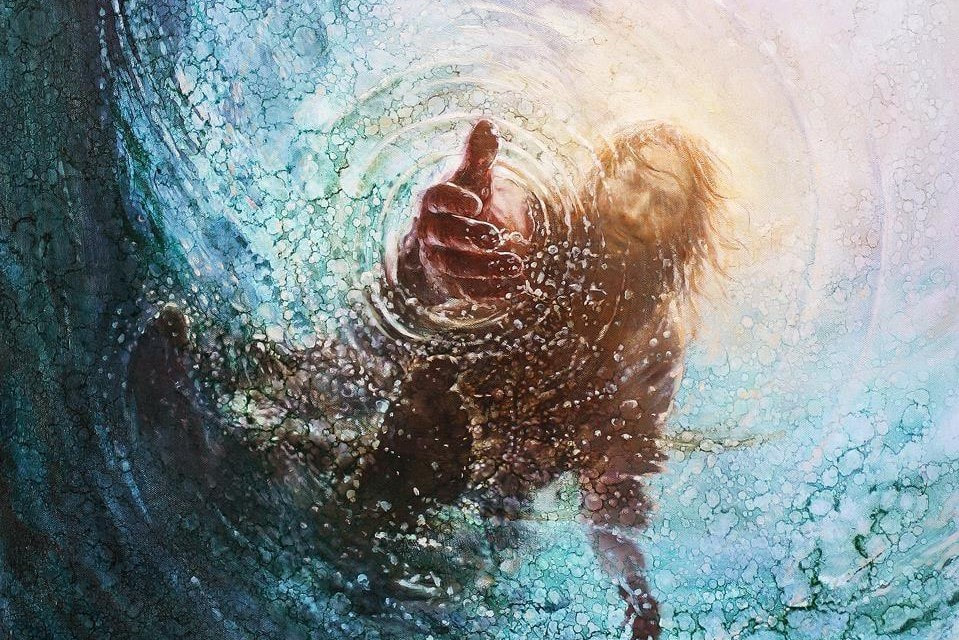
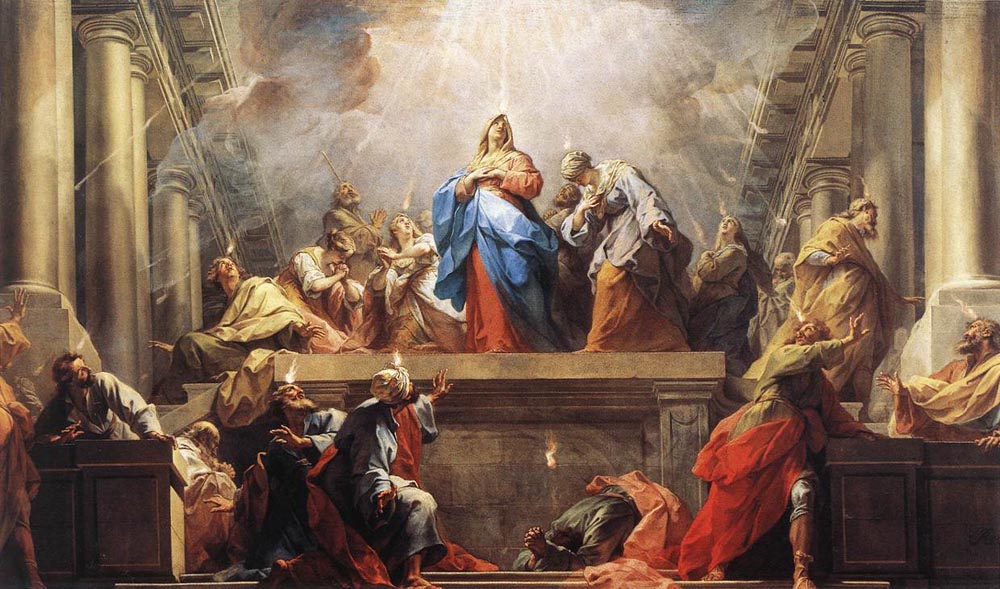
 RSS Feed
RSS Feed 